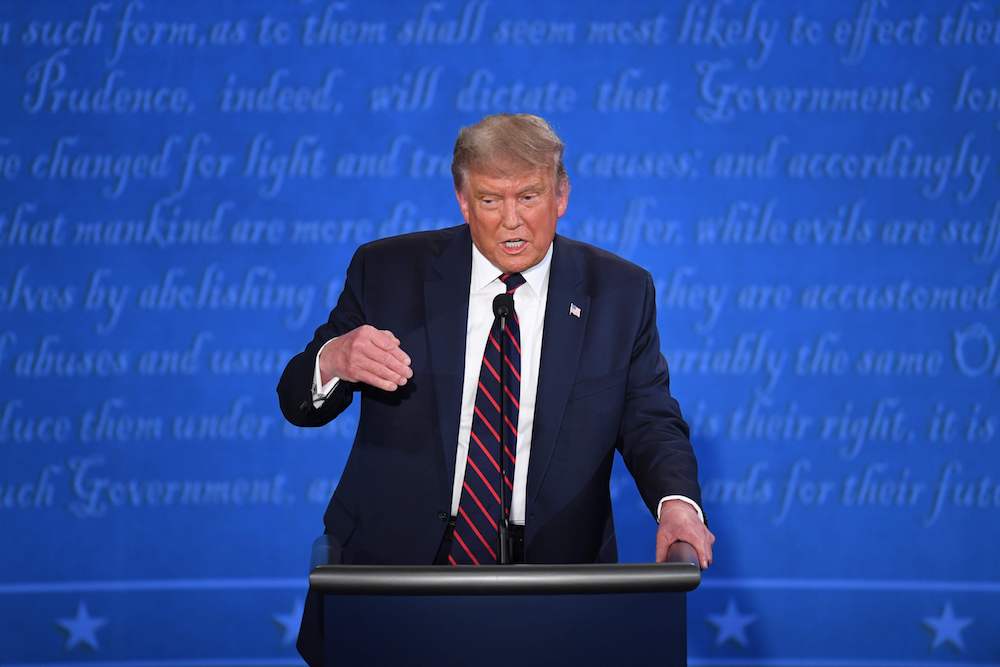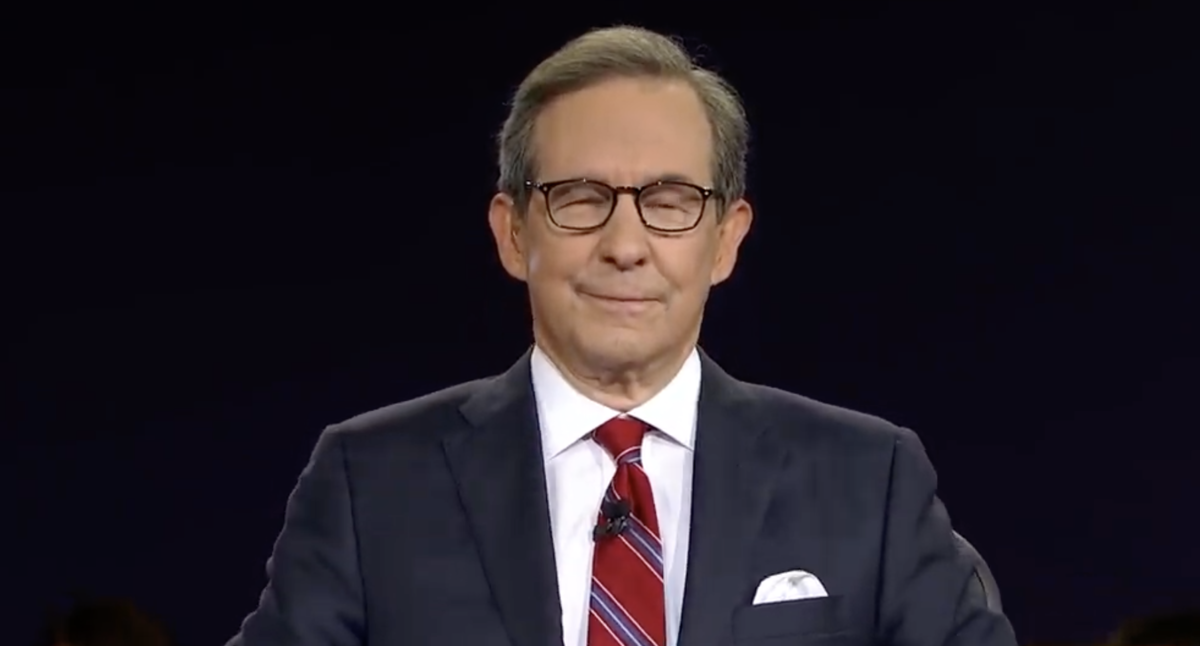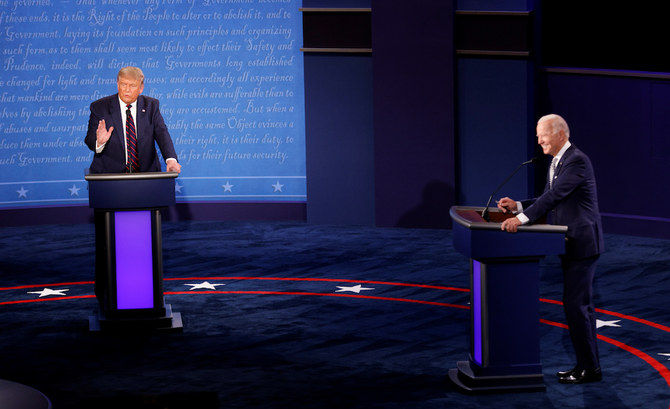CLEVELAND: Marked by angry interruptions and bitter accusations, the first debate between President Donald Trump and Democratic challenger Joe Biden erupted in contentious exchanges Tuesday night over the coronavirus pandemic, city violence, job losses and how the Supreme Court will shape the future of the nation’s health care.
In what was the most chaotic presidential debate in recent years, somehow fitting for what has been an extraordinarily ugly campaign, the two men frequently talked over each other with Trump interrupting, nearly shouting, so often that Biden eventually snapped at him, “Will you shut up, man?”
“The fact is that everything he’s said so far is simply a lie,” Biden said. “I’m not here to call out his lies. Everybody knows he’s a liar.”
Trump and Biden arrived in Cleveland hoping the debate would energize their bases of support, even as they competed for the slim slice of undecided voters who could decide the election. It has been generations since two men asked to lead a nation facing such tumult, with Americans both fearful and impatient about the coronavirus pandemic that has killed more than 200,000 of their fellow citizens and cost millions of jobs.
Over and over, Trump tried to control the conversation, interrupting Biden and repeatedly talking over the moderator, Chris Wallace of Fox News. The president tried to deflect tough lines of questioning — whether on his taxes or the pandemic — to deliver broadsides against Biden.
The president drew a lecture from Wallace, who pleaded with both men to stop interrupting. Biden tried to push back against Trump, sometimes looking right at the camera to directly address viewers rather than the president and snapping, “It’s hard to get a word in with this clown.”
But despite his efforts to dominate the discussion, Trump was frequently put on the defensive and tried to sidestep when he was asked if he was willing to condemn white supremacists and paramilitary groups.
“What do you want to call them? Give me a name. Give me a name,” Trump said, before Wallace mentioned the far right, violent group known as the Proud Boys. Trump then pointedly did not condemn the group, instead saying, “Proud Boys, stand back, stand by, but I’ll tell you what, somebody’s got to do something about Antifa and the left because this is not right-wing problem. This is a left wing problem."
The vitriol exploded into the open when Biden attacked Trump's handling of the pandemic, saying that the president “waited and waited" to act when the virus reached America's shores and “still doesn’t have a plan.” Biden told Trump to “get out of your bunker and get out of the sand trap” and go in his golf cart to the Oval Office to come up with a bipartisan plan to save people.
Trump snarled a response, declaring that “I'll tell you Joe, you could never have done the job that we did. You don’t have it in your blood."
“I know how to do the job,” was the solemn response from Biden, who served eight years as Barack Obama's vice president.
The pandemic’s effects were in plain sight, with the candidates’ lecterns spaced far apart, all of the guests in the small crowd tested and the traditional opening handshake scrapped. The men did not shake hands and, while neither candidate wore a mask to take the stage, their families did sport face coverings.
Trump struggled to define his ideas for replacing the Affordable Care Act on health care in the debate’s early moments and defended his nomination of Amy Coney Barrett, declaring that “I was not elected for three years, I’m elected for four years.”
“We won the election. Elections have consequences. We have the Senate. We have the White House and we have a phenomenal nominee, respected by all.”
Trump criticized Biden over the former vice president's refusal to comment on whether he would try to expand the Supreme Court in retaliation if Barrett is confirmed to replace the late Justice Ruth Bader Ginsburg.
The president also refused anew to embrace the science of climate change.
As the conversation moved to race, Biden accused Trump of walking away from the American promise of equity for all and making a race-based appeal.
“This is a president who has used everything as a dog whistle to try to generate racist hatred, racist division,” Biden said.
Recent months have seen major protests after the deaths of Black people at the hands of police. And Biden said there is systemic racist injustice in this country and while the vast majority of police officers are “decent, honorable men and women” there are “bad apples” and people have to be held accountable.
Trump in turn claimed that Biden’s work on a federal crime bill treated the African American population “about as bad as anybody in this country.” The president pivoted to his hardline focus on those protesting racial injustice and accused Biden of being afraid to use the words “law and order,” out of fear of alienating the left.
“Violence is never appropriate,” Biden said. “Peaceful protest is.”
With just 35 days until the election, and early voting already underway in some states, Biden stepped onto the stage holding leads in the polls — significant in national surveys, close in some battleground states — and looking to expand his support among suburban voters, women and seniors. Surveys show the president has lost significant ground among those groups since 2016, but Biden faces his own questions encouraged by Trump’s withering attacks.
Follow the debate as it happened below, all times GMT:
02:25 - As we near the end of the debate, fair elections and the integrity of the election comes up. Trump calls the expected widespread voting-by-mail a "fraud" and says we may not know the result of the election "for months."
Biden tells Americans they have the power to choose the direction the US will take for the next four years, and whether they want four more years of Trump's lies.
QUOTE: “Show up and vote. You will determine the outcome of this election. Vote, vote, vote,” Biden said.
02:15 - The next segment of the debate moves onto climate change, Trump outlines his supposed achievements in the sector during his term in office, but the big takeaway is Biden saying he would rejoin the Paris accord on climate - which Trump pulled the US out of - if he’s elected president.
Biden also admits that he would not support the Democratic plan known as the “Green New Deal” - which critics have said goes too far and is too expensive - and instead says he backs his own “Biden Deal.”
02:05 -
QUOTE: In rebuttal, Trump tells Biden: “In 47 months, I’ve done more than you’ve done in 47 years.”
01:55 - Trump goes for a personal attack, aiming for Biden's son Hunter for business dealing in Ukraine. Biden steers conversation away back toward coronavirus pandemic and its ravaging of US families, debate should not focus on his family.
QUOTE: Facing interruption from Trump and told to offer up his word, Biden says: “It’s hard to get any word in with this clown -- excuse me, this person.”
01:45 - When quizzed on his approach to the shutdown of the American economy, Trump quickly blames what he calls the “China Plague” for forcing him into the shutdown of a self-proclaimed “greatest economy ever built”...
01:35 - Trump is asked to qualify why the American public should trust him on COVID-19 - Biden uses his segment to say that Trump could not be trusted, and that the public's trust should be placed in the scientists. Trump asserts that Biden would have "lost way more people" had he been in power.
QUOTES: Trump to Biden: “You didn't think we should've closed our country (to China) because you thought it was terrible... We've done a great job. But I tell you, Joe, you could never have done the job we've done. You don't have it in your blood.”
01:25 - As Trump takes a question regarding his policy on healthcare, the segment descends into a shouting match between the two candidates - who throw insults at each other - but the thrust of Trump's argument is "Obama-care doesn't work, and is too expensive to run." Biden ends the segment by saying "Keep yapping, man..."
QUOTES: Biden, told by Trump that he has adopted former Democratic presidential rival Bernie Sanders “socialized medicine” proposals: “Everybody here knows he's a liar ... you picked the wrong guy on the wrong night at the wrong time.”
“Folks, do you have any idea what this clown's doing? I tell you what, he is not for anybody needing healthcare.” After Trump explains his health proposal, Biden says: “He has no plan for healthcare. ... The fact is this man has no idea what he's talking about.”

01:15 - Trump fields his first question and it regards his Supreme Court nomination - in an election year - of Amy Coney Barrett. Trump justifies the nomination - saying “elections have consequences,” and saying Barrett would be “as good as anybody that has served on that court. We won the election, and therefore we have the right to choose her.”
Biden responds by saying results of the upcoming election should determine who nominates the justice to fill the seat of Ruth Bader Ginsburg. “We should wait and see what the outcome of this election is,” Biden said.
01:05 - With both candidates on stage, we're under way...
01:00 - With the First Lady Melania Trump and the rest of the Trump family in place, moderator Chris Wallace of FOX News lays down the ground rules of the debate. Seconds away...

00:45 - We are minutes away as Trump and Biden are all set for the much anticipated first presidential debate. Millions across America are on the edge of their seats...
*With AP


























